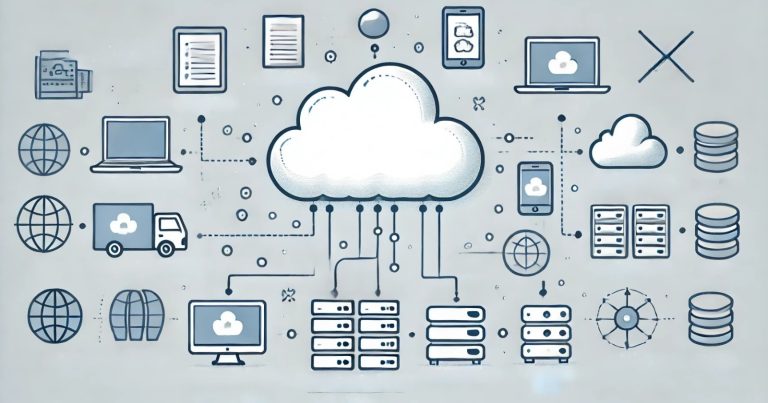Cloud technologies also provide a variety of platforms, services and tools that enable individuals and organizations to access and utilize computing resources stored on the internet. These technologies enable users to store, access and process data in the cloud without local servers or personal hardware. The list ranges from mainstream cloud services such as Amazon Web Services (AWS), Microsoft Azure, Google Cloud Platform, among others. Cloud Technologies List: A list of services that aid in storage, software, and networking, for users to choose the right solution for cloud needs development.
What is Cloud Technology?
Cloud technology means providing computing services such as storage, networking, software, analytics and databases over the internet known as the cloud. Users pay as they use these services instead of owning hardware or software.
Schools, businesses, healthcare, entertainment, and even people who want secure access to data and software anywhere in the world are using cloud technology. Cloud computing is the on-demand delivery of IT resources analytic, databases, networking, servers, and storage over the Internet. These options offer more rapid innovation, easier scalability, and more resource flexibility.
Cloud Technologies List
Let’s examine the cloud technologies list, which includes the most used platforms and services in the world today. These tools help coordinate everything from hosting websites to real-time big data analysis.
Amazon Web Services (AWS)
AWS is the world’s leading cloud services provider. It provides several services, such as EC2 for computing, S3 for storage, Lambda for serverless computing, etc. AWS is known to have good security, performs well, and has many features. AWS is used by everything from startups to big companies to run their websites, apps, and databases. Its wealth of tools makes it suitable for almost every cloud requirement.
Microsoft Azure
Many companies, especially those already using Microsoft products, pick Microsoft Azure as the first choice. It integrates seamlessly with tools such as Office 365 and Windows Server. This includes azure virtual machines, blob storage, and azure kubernetes service. Azure is a choice made by government offices and big companies due to its support and reliability. It enables teams to build, manage, and deploy apps around a worldwide network.
Google Cloud Platform (GCP)
GCP (Google Cloud Platform) is popular for its data analytics and machine learning services. It comprises big queries, a Google app engine, and a Google compute engine. Many companies use GCP to handle extensive data and run complex models. GCP is also favored by enterprises looking to use data for informed decision-making. Its tools assist control in various industries’ acceleration, precision, and creativity .
IBM Cloud
IBM cloud specializes in hybrid cloud and AI. Special tools for AI and machine learning for IBM Watson have also been added. Solution for business organizations Cloud offers bare metal servers and blockchain services that provide secure solutions to businesses. IBM Cloud is popular among companies that require potent data protection and intelligent systems. It works great as a private and public cloud.
Oracle Cloud
Oracle Cloud is widely recognized for powering enterprise applications like databases and resource planning. It also provides higher-end offerings such as Oracle Autonomous Database, which requires minimal oversight to run itself. Oracle Cloud is used by companies to process and reserve huge-scale business data. This database system is a great option for companies who require an efficient, secure, and quick database system.
Alibaba Cloud
Again, Alibaba is a top Asian cloud provider and is a common partner for e-commerce companies. It offers services like AWS: computing, storage, networking, etc. Alibaba Cloud is used by many businesses in Asia to operate their online stores and service customer data. Designed to suit the growing needs of large businesses with high traffic, Zoho provides a solid platform for businesses in the digital marketplace.
Salesforce Cloud
Sales Cloud is the leading CRM platform worldwide. This covers various services such as Sales Cloud, Marketing Cloud, Service Cloud, etc. Businesses utilize it to organize customer communications, sales, and marketing efforts. Salesforce keeps teams connected with their customers and elevates the quality of service. Verified by businesses large and small across the globe.
VMware Cloud
VMware Cloud aids organizations to transition from legacy IT environments to modern, cloud-native systems. Its most common use cases are virtualization and hybrid cloud environments. Businesses run legacy software in the cloud without making significant changes using VMware Cloud. It allows a smooth transition to the cloud without losing control of existing systems. Ideal for enterprises seeking secure and flexible Cloud solutions.
Dropbox, OneDrive, and Google Drive
Yes, Dropbox, OneDrive and Google Drive are personal cloud storage services for individuals and small teams. They help users store, share and access files from anywhere. These tools are straightforward to work with and are really helpful for archiving documents, photos, and work files. Students and small businesses widely use them for everyday cloud storage and collaboration.
Cloud Deployment Models
Cloud services come in different types, ranging from public to private and hybrid based on control, security, and management requirements. — These are referred to as cloud deployment models. The right deployment model to choose depends on your data’s sensitivity, budget, and regulatory needs.
- Public cloud: Public clouds deliver resources like compute, storage, network, develop-and-deploy environments, and applications via the internet. They are maintained and operated by third-party cloud service providers such as Google Cloud.
- Private cloud: Used, built, and operated by a single organization, private clouds are usually on-premises. They offer enhanced control, configurability, and data protection but also share the same financial and resource constraints that accompany traditional IT environments.
- Hybrid cloud: When you have at least one private computing environment (on-premise infrastructure or private cloud, edge as well) coupled with one or more public clouds, it is referred to as hybrid cloud. They enable the ability to use the resources and services available from different computing environments as well as to choose the one that is the most appropriate for those workloads.
Differences Between IaaS, PaaS, SaaS, and Serverless
Cloud services are also categorized by degree of control and responsibility. Service models is the term for them. These services can be categorized in four common types which are IaaS (Infrastructure as a Service), PaaS (Platform as a Service), SaaS (Software as a Service), and Serverless computing. They each provide varying degrees of access to cloud resources.
| Feature | IaaS | PaaS | SaaS | Serverless |
| Control | Full over OS & apps | Only apps | None (just usage) | Only code logic |
| Setup Time | Long | Medium | Quick | Quick |
| Best For | System admins | Developers | End-users | Developers |
| Cost | Pay-as-you-go | Medium | Subscription-based | Pay-per-execution |
| Examples | AWS EC2, Azure VM | Google App Engine | Gmail, Dropbox | AWS Lambda, Azure Functions |
Relevance to ACCA Syllabus
Cloud technologies will apply to the ACCA qualification’s Strategic Business Leader (SBL) and Audit and Assurance (AA) papers. ACCA enables future accountants by considering how these cloud-based solutions shape audit planning, risk management, and financial reporting. Being familiar with tools like Microsoft Azure, AWS, or Google Cloud enables accountants to help enterprises with safe, real-time access to economic data, remote audit processes, and expandable accounting systems.
Cloud Technologies List ACCA Questions
Q1: One of the popular cloud platforms for storing and accessing accounting data is?
A) SAP HANA
B) Microsoft Azure
C) Visual Studio
D) QuickBooks Desktop
Ans: B) Microsoft Azure
Q2: Help us to brainstorm: What is one key benefit of using cloud-based audit tools?
A) They absolve ethical obligations
B) They allow real-time access to data
C) They simplify the need for audit report
D) They are a substitute for financial statements
Ans: B) They minute offer real time data access
Q3: What is an example of a cloud service model that delivers ready-to-run applications such as accounting software?
A) SaaS
B) IaaS
C) PaaS
D) DaaS
Ans: A) SaaS
Q4: In what ways do cloud technologies enhance internal audit processes?
A) By compromising auditor independence
B) Enables continuous monitoring of data
C) Because it does away with the need for standards
D) Concealing control weaknesses
Ans: B) Continuous data monitoring
Q5: Which ACCA subject focuses on the role of technology, such as cloud computing, in making strategic decisions?
A) Audit and Assurance
B) Strategic Business Leader
C) Taxation
D) Performance Management
Ans: B) Strategic Business Leader
Relevance to US CMA Syllabus
The US CMA syllabus covers the aspects of utilizing digital technologies to aid and enhance the role of finance in an enterprise—especially in Part 1: Financial Planning, Performance, and Analytics. Cloud-based technologies enable CMAs to work with up-to-date financial data, automate forecasting processes, and mitigate data security risks. Understanding AWS Oracle Cloud and Google Cloud empowers financial planning, cost control, and performance monitoring.
Cloud Technologies List CMA Questions
A1: A cloud-based ERP system that allows CMAs to monitor monetary transactions and performance is NetSuite.
A) Oracle NetSuite
B) Dropbox
C) Google Drive
D) Excel 2007
Ans: A) Oracle NetSuite
Q2: In what common cloud model can budgeting tools be accessed online?
A) IaaS
B) PaaS
C) SaaS
D) DRaaS
Ans: C) SaaS
Q3: Cloud-based budgeting tools: one of their advantages is:
A) Eliminates cost reports
B) It allows for collaboration the moment the relevant information becomes available
C) Removes financial controls
D) Requires no planning
Ans: B) Enables real time co-operation
Q4: In setting the framework for financial analytics, how are cloud platforms involved?
A) Printing audit documents
B) Storing and analyzing massive amounts of financial data
C) Filing paper tax returns
D) Drafting physical vouchers
Ans: B) Storing and processing large amounts of financial data
Q5: Which part of the CMA exam includes content related to cloud technologies and analytics tools?
A) Part 2
B) Part 1
C) Ethics section
D) Regulatory compliance 존
Ans: B) Part 1
Relevance to CFA Syllabus
Cloud technologies are relevant for handling big datasets and real-time market analysis (which is tested highly in the CFA program, particularly in Level I (i.e., Quantitative Methods) and Level II (i.e., Portfolio Management). Portfolio simulations, risk modeling, and back-testing strategies are performed via AWS ( Amazon Web Services) and those similar to Google Cloud by investment professionals. Cloud technology helps inform investment decisions powered by data.
Cloud Technologies List CFA Questions
Q1: What is a popular cloud platform for investment firms running complex financial models?
A) Microsoft Word
B) Amazon Web Services (AWS)
C) Notepad++
D) Sage 50
Ans: B) Amazon Web Services( AWS)
Q2: What cloud tech enables investment analysts to run predictive models without having to install software on their desktops?
A) SaaS
B) IaaS
C) DRaaS
D) LAN
Ans: A) SaaS
Q3: Cloud platforms are of most help in portfolio management with:
A) Manual trading
B) Data backup only
C) Analysis of the real-time market data
D) Tax filing
Ans: C) Analysis of the real-time data in the stock market
Q4: What is a cloud platform that is used to perform financial analytics and machine learning?
A) AWS SageMaker
B) Excel 2003
C) Windows Media Player
D) Oracle Forms
Ans: A) AWS SageMaker
Q5: What is the best aligned cloud benefit with CFA?
A) Printing stock reports
B) Access to real-time data for market timing
C) Editing images for reports
D) Tracking job applications
Ans: B) Market timing through real-time data access
Relevance to US CPA Syllabus
Cloud computing has been tested on the BEC and AUD sections of the US CPA exam. CPAs use cloud technologies to secure financial records, run remote audits, and manage enterprise risk. Platforms such as Microsoft Azure, QuickBooks Online, and Google Cloud allow for scalable accounting operations, monitoring regulatory compliance, and better information integrity in audits and financial reports.
Cloud Technologies List CPA Questions
Q1: The cloud-based accounting tool that CPAs often use for real-time bookkeeping.
A) QuickBooks Online
B) TurboTax CD version
C) Microsoft Excel 2007
D) Peachtree Classic
Ans: A) QuickBooks Online
Q2: Which increases CPAs’ ability to perform remote audits and monitor transactions in real time?
A) SaaS
B) IaaS
C) DaaS
D) DRaaS
Ans: A) SaaS
Q3: What is one of the primary advantages of cloud-based audit platforms?
A) No need for controls
B) Instant access to client data from multiple locations
C) Paper-based audit trails
D) Limited data visibility
Ans: B) Availability of all client data from several location
Q4: What CPA exam section includes cloud technologies?
A) REG
B) AUD
C) FAR
D) Ethics
Ans: B) AUD
Q5: Which cloud tool is used to upload and save sensitive financial documents and client records securely?
A) Google Cloud Storage
B) Paint
C) Internet Explorer
D) Movie Maker
Ans: A) Google Cloud Storage


